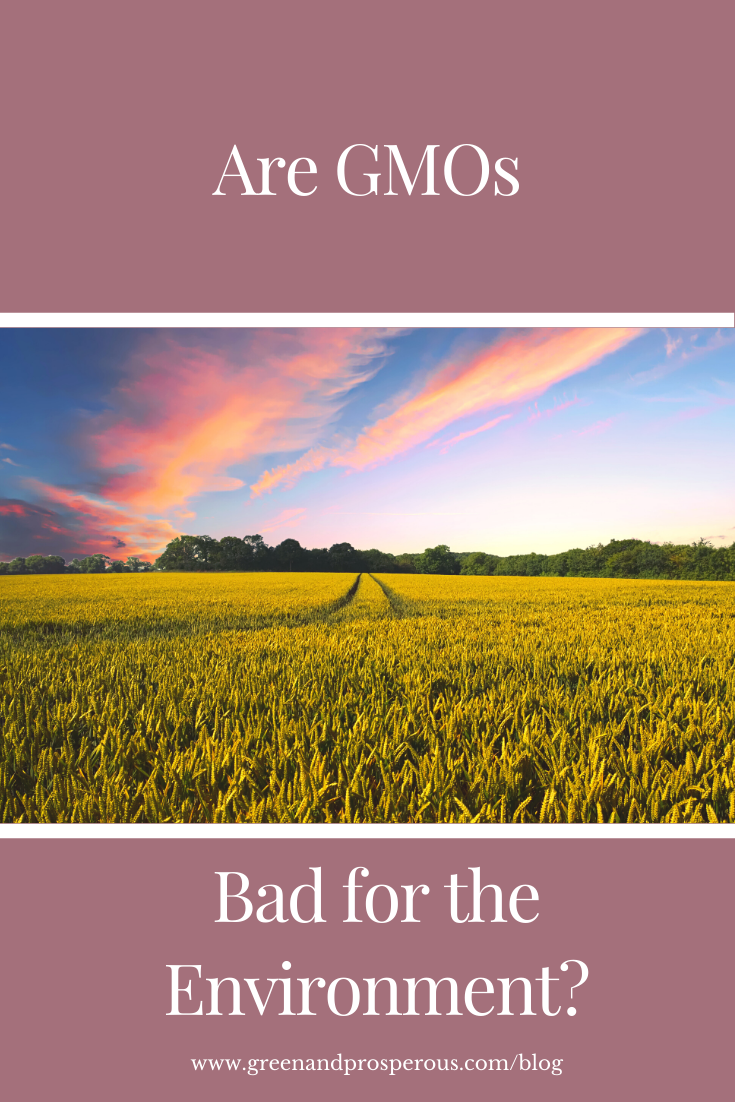Are GMOs Bad for the Environment?
/While we see a lot of fiery debates about the impacts of genetically modified organisms (GMOs) on our health, discussions of the environmental impacts of GMOs are much less common.
For many, the phrase “genetically modified” conjures up images of home-grown science experiments or lab projects gone wrong. While in reality, genetically modified organisms are a lot less scary than the name implies, their environmental impacts should still leave us concerned.
After explaining what exactly GMOs are, this article discusses how GMOs impact the environment to help us answer the question “are GMOs bad for the environment?”
What Are GMOs?
Genetically modified organisms are any organism whose genetic material (DNA) has been artificially altered. GMOs usually refer to plants, particularly crop foods like corn or soybeans.
Genetically modified crops were created for a number of reasons, and aim to reduce farming issues caused by insects, weeds, and other pests. Some recent GMOs are engineered to increase their nutritional value.
Genetically modified organisms are intended to address food insecurity worldwide by making it easier to get high crop yields, as pests are less of an issue. Some GMO crops are engineered to be more pest-resistant.
Many GMOs are engineered to be resistant to herbicides, making weed control easier for farmers. The biggest example of this is Monsanto’s ‘RoundUp Ready’ crops. First created in 1996, these seeds are genetically modified to resist Monsanto’s herbicide, RoundUp. RoundUp Ready crops allow farmers to indiscriminately spray their fields with herbicide, killing weeds without killing their crops.
Despite the claims of many seed and chemical companies, GMOs have not been shown to actually reduce food insecurity. This is likely because GMOs are mostly used to feed livestock or to fuel cars. However, in some cases GMOs do increase the availability of crucial nutrients. For example, genetically modified golden rice supplements some communities with nutrients they’re not getting, like Vitamin A.
Environmental Impacts of GMOs
Loss of Biodiversity
GMOs contribute to a loss of biodiversity, or the amount of different living plant and animal species.
Genetically modified organisms may reduce biodiversity by being “too strong.” In other words, GMOs are specifically bred to have certain advantageous genes that allow them to outcompete their neighbors. While this may be good for farmers, it is not good for plants or animals around them that compete with GMOs.
GM crops are often planted as a monoculture, which means it is in the only crop grown in a single area. Growing a single crop makes it more likely that a single pest or climatic condition will wipe out the entire crop, risking increased food insecurity. Biodiversity loss also makes plants and animals less adaptable to harsh conditions and changes in temperature, which is an increasingly large issue as climate change continues.
Monoculture GM crops reduce the variety of nutrients found in soil, decreasing soil health, and make it more difficult for certain insects to survive if only one food source is available.
Lastly, using RoundUp Ready GM crops makes pesticide use easier, which kills off any plants near the crop that aren’t RoundUp Ready. Not only does this reduce biodiversity, but it can actually harm overall crop yields in the long term, as growing cover crops (plants that are grown to improve the quality of soil rather than for food) preserves soil health and prevents soil erosion.
Increased Pesticide Use
Producers of genetically modified seeds have claimed that GMOs are good for the environment due to reduced pesticide use. In reality, studies show they have actually increased pesticide use and caused a number of environmental problems. For example, according to a 2016 study, RoundUp usage has increased 15-fold since RoundUp-ready genetically modified crops were first introduced to the commercial agriculture industry.
Another thing to keep in mind is that pesticides used on farm fields don’t stay on farm fields. Instead, the chemicals can leach out into soil and water. A 2018 study published in the journal Environmental Sciences Europe found that RoundUp accumulates in the environment and harms wildlife, including important pollinators like bees. RoundUp also causes changes in soil microbial communities, which can decrease soil health and fertility over time.
Pesticide use can also lead to ocean acidification as excess chemical fertilizers are deposited into the ocean.
Bigger Farms
Crops that are genetically modified to be pesticide-resistant encourage farms to get bigger, as weed and pest control is easier.
Large-scale farming has several negative environmental impacts. First, it often requires more machinery, which increases carbon dioxide emissions and other forms of pollution.
Second, bigger farms contribute to higher rates of deforestation. This reduces forests’ capacity to store carbon, contributing to climate change. For example, 100 million hectares of land was cleared in the Amazon rainforest in order to plant soybeans. Clearing of the Amazon rainforest is expected to raise the rate of global warming by as much as 50 percent, which will also cause a huge loss of biodiversity.
Environmental Impacts of Genetically Modified Organisms
Impacts on Human Health
While this is not strictly an environmental impact, human health is a factor of environmental health, and health concerns about GMOs must be addressed.
Eating genetically modified organisms on their own is really not a health concern; they are just as safe as non-GMO foods. However, most GMOs are sprayed with pesticides. In particular, RoundUp Ready crops like corn, soybeans, and beets are often sprayed with pesticides.
There are very few regulations on pesticide usage in the U.S. While there are many food safety certifications aimed at farmed-food safety, most do not include an analysis of genetic modification or pesticide use.
A 2014 meta-analysis study by two researchers at the International Agency for Research on Cancer in Lyon, France shows that exposure to glyphosate, the main ingredient in RoundUp, can double your chances of getting Non-Hodgkin lymphoma (NHL). While not all of us use RoundUp, a 2021 study shows that most Americans are exposed to glyphosate in their diets, particularly through grain and legumes. Glyphosate may be safe at low levels, but the jury is literally still out on that.
Should I Avoid GMOs?
After learning about the negative effects of GMOs on the environment, the green-conscious cook may be concerned about buying and eating genetically modified organisms.
First, figuring out which foods are genetically modified is starting to get easier. As of January 1, 2022, the USDA is requiring companies to label “bioengineered foods” with text, a label, and/or a scannable link.
As discussed above, while eating genetically modified foods is proven to be safe, you can certainly take a stance against the negative environmental impacts of GMOs by not buying GMO items. While you’re at it, eating certified organic foods is your best bet for avoiding dangerous pesticides.
You can also consider supporting several nonprofit organizations like the Organic Consumers Organization and the Non GMO Project. These organizations are working to provide more non-GMO food choices and to push GMO-producing companies to make changes to use GMOs responsibly and sustainably.
About the Author:
David Evans writes to share uncommon insights with people who want to understand their world a little bit better. His main focus is on our relationship with the natural environment, but he also explores other interests like how tech is reshaping our future and how the human experience is changing. You can learn more about sustainable farming at https://learnregenerativeagriculture.com/.
Like this? Please pin!








































